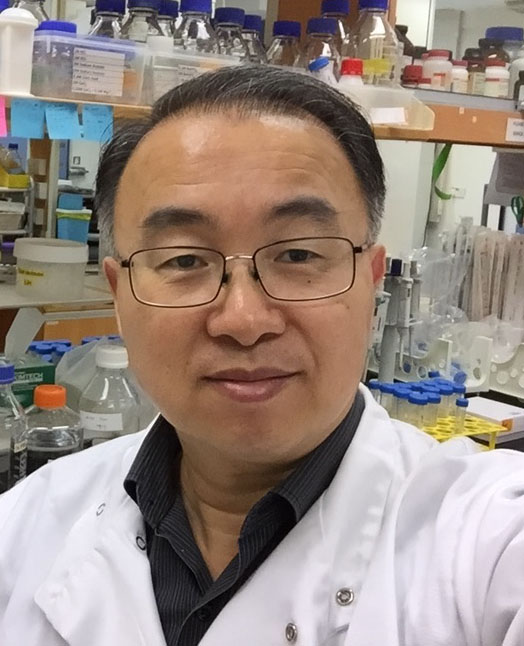Jinhua Lu
Postgraduate:
Main Appointment:
Joint Appointments:
Research Fields:
Research Areas:
Research Fields:
- STEMM – Science, Technology, Engineering, Mathematics, Medical Sciences
Research Keywords:
- Recombinant Vaccine
- Adjuvant
- Cancer
- Viral
- Translational
Current Appointments:
Brief Description of Research:
Since 2019, we have embarked on a translation project to develop a new adjuvant platform for therapeutic cancer and viral vaccines. The adjuvant platform has been filed for patents and this project has gained supports from three technology acceleration agencies. Basically, our invention is a panel of adjuvants that overcome the barrier that current recombinant vaccines encounter, i.e. the failure to induce cytotoxic T lymphocyte immunity which is key to cancer cell killing and eradication of chronic viral infections. The platform consists of three components: 1) the generation of vaccine antigens using eukaryotic, yeast, bacterial and synthesis methods; 2) immunological assays to evaluate responses to vaccines in vivo and ex vivo; and 3) disease models for preclinical efficacy/toxicity studies preparing for clinical trials. A PhD project is available that involves mainly the 1st and 2nd segments.
Total Number of Publications:
Five Representative Publications:
1. Cai Y, Teo BH, Yeo JG and Lu J. 2015. C1q binds to apoptotic nucleolus and causes C1 protease degradation of nucleolar proteins. J. Biol. Chem. 290, 22570.
2. Yeo JG, Leong J, Arkachaisri T, Cai Y, Teo BH, Tan JH, Das L and Lu J. 2016. Proteolytic
inactivation of nuclear alarmin high-mobility group box 1 by complement protease C1s during
apoptosis. Cell Death Discov. 2,16069.
3. Lu J and Kishore U. 2017. C1 Complex: An Adaptable Proteolytic module for complement and
non-complement functions. Front Immunol. 8, 592.
4. Cai Y, Wee SY, Chen J, Teo BH, Ng YL, Leong KP, and Lu J. 2018. Broad susceptibility of
nucleolar proteins and autoantigens to complement C1 protease degradation. J Immunol.
199, 3981
5. Chen J, Teo BHD, Cai Y, Wee SY, Lu J. 2018. The linker histone H1.2 is a novel component of
the nucleolar organizer regions. J Biol Chem. 193, 2358
My Research Videos:
Top 5 Publications:
- Lorem ipsum dolor sit amet
- Lorem ipsum dolor sit amet
- Lorem ipsum dolor sit amet
- Lorem ipsum dolor sit amet
- Lorem ipsum dolor sit amet
Journals Published:
- Lorem ipsum dolor sit amet
- Lorem ipsum dolor sit amet
- Lorem ipsum dolor sit amet
- Lorem ipsum dolor sit amet
- Lorem ipsum dolor sit amet

Jinhua Lu
Appointments
Education
Research Areas
- Recombinant Vaccine
- Adjuvant
- Cancer
- Viral
- Translational
Research Description
Since 2019, we have embarked on a translation project to develop a new adjuvant platform for therapeutic cancer and viral vaccines. The adjuvant platform has been filed for patents and this project has gained supports from three technology acceleration agencies. Basically, our invention is a panel of adjuvants that overcome the barrier that current recombinant vaccines encounter, i.e. the failure to induce cytotoxic T lymphocyte immunity which is key to cancer cell killing and eradication of chronic viral infections. The platform consists of three components: 1) the generation of vaccine antigens using eukaryotic, yeast, bacterial and synthesis methods; 2) immunological assays to evaluate responses to vaccines in vivo and ex vivo; and 3) disease models for preclinical efficacy/toxicity studies preparing for clinical trials. A PhD project is available that involves mainly the 1st and 2nd segments.
Research Videos
Selected Publications
1. Cai Y, Teo BH, Yeo JG and Lu J. 2015. C1q binds to apoptotic nucleolus and causes C1 protease degradation of nucleolar proteins. J. Biol. Chem. 290, 22570.
2. Yeo JG, Leong J, Arkachaisri T, Cai Y, Teo BH, Tan JH, Das L and Lu J. 2016. Proteolytic
inactivation of nuclear alarmin high-mobility group box 1 by complement protease C1s during
apoptosis. Cell Death Discov. 2,16069.
3. Lu J and Kishore U. 2017. C1 Complex: An Adaptable Proteolytic module for complement and
non-complement functions. Front Immunol. 8, 592.
4. Cai Y, Wee SY, Chen J, Teo BH, Ng YL, Leong KP, and Lu J. 2018. Broad susceptibility of
nucleolar proteins and autoantigens to complement C1 protease degradation. J Immunol.
199, 3981
5. Chen J, Teo BHD, Cai Y, Wee SY, Lu J. 2018. The linker histone H1.2 is a novel component of
the nucleolar organizer regions. J Biol Chem. 193, 2358
